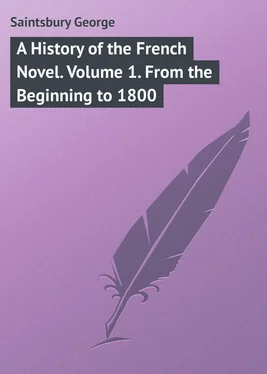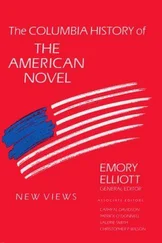George Saintsbury - A History of the French Novel. Volume 1. From the Beginning to 1800
Здесь есть возможность читать онлайн «George Saintsbury - A History of the French Novel. Volume 1. From the Beginning to 1800» — ознакомительный отрывок электронной книги совершенно бесплатно, а после прочтения отрывка купить полную версию. В некоторых случаях можно слушать аудио, скачать через торрент в формате fb2 и присутствует краткое содержание. Жанр: foreign_language, foreign_prose, на английском языке. Описание произведения, (предисловие) а так же отзывы посетителей доступны на портале библиотеки ЛибКат.
- Название:A History of the French Novel. Volume 1. From the Beginning to 1800
- Автор:
- Жанр:
- Год:неизвестен
- ISBN:нет данных
- Рейтинг книги:4 / 5. Голосов: 1
-
Избранное:Добавить в избранное
- Отзывы:
-
Ваша оценка:
- 80
- 1
- 2
- 3
- 4
- 5
A History of the French Novel. Volume 1. From the Beginning to 1800: краткое содержание, описание и аннотация
Предлагаем к чтению аннотацию, описание, краткое содержание или предисловие (зависит от того, что написал сам автор книги «A History of the French Novel. Volume 1. From the Beginning to 1800»). Если вы не нашли необходимую информацию о книге — напишите в комментариях, мы постараемся отыскать её.
A History of the French Novel. Volume 1. From the Beginning to 1800 — читать онлайн ознакомительный отрывок
Ниже представлен текст книги, разбитый по страницам. Система сохранения места последней прочитанной страницы, позволяет с удобством читать онлайн бесплатно книгу «A History of the French Novel. Volume 1. From the Beginning to 1800», без необходимости каждый раз заново искать на чём Вы остановились. Поставьте закладку, и сможете в любой момент перейти на страницу, на которой закончили чтение.
Интервал:
Закладка:
John Lyly is a person of much more consequence in English literature than the conceited and pragmatical pedant who wrote Pierce's Supererogation . He is familiar, almost literally to every schoolboy, as the author of the charming piece, "Cupid with my Campaspe Played," and his dramatic work will come in for notice in a future chapter; but he is chiefly thought of by posterity, whether favourably or the reverse, as the author of Euphues . Exceedingly little is known about his life, and it is necessary to say that the usually accepted dates of his death, his children's birth, and so forth, depend wholly on the identification of a John Lilly, who is the subject of such entries in the registers of a London church, with the euphuist and dramatist – an identification which requires confirmation. A still more wanton attempt to supplement ignorance with knowledge has been made in the further identification with Lyly of a certain "witty and bold atheist," who annoyed Bishop Hall in his first cure at Hawstead, in Suffolk, and who is called "Mr. Lilly." All supposed facts about him (or some other John Lyly), his membership of Parliament and so forth, have been diligently set forth by Mr. Bond in his Oxford edition of the Works , with the documents which are supposed to prove them. He is supposed, on uncertain but tolerable inferences, to have been born about 1554, and he certainly entered Magdalen College, Oxford, in 1569, though he was not matriculated till two years later. He is described as plebeii filius , was not on the foundation, and took his degree in 1573. He must have had some connection with the Cecils, for a letter of 1574 is extant from him to Burleigh. He cannot have been five and twenty when he wrote Euphues , which was licensed at the end of 1578, and was published (the first part) early next year, while the second part followed with a very short interval. In 1582 he wrote an unmistakable letter commendatory to Watson's Hecatompathia , and between 1580 and 1590 he must have written his plays. He appears to have continued to reside at Magdalen for a considerable time, and then to have haunted the Court. A melancholy petition is extant to Queen Elizabeth from him, the second of its kind, in which he writes: "Thirteen years your highness' servant, but yet nothing." This was in 1598: he is supposed to have died in 1606. Euphues is a very singular book, which was constantly reprinted and eagerly read for fifty years, then forgotten for nearly two hundred, then frequently discussed, but very seldom read, even it may be suspected in Mr. Arber's excellent reprint of it, or in that of Mr. Bond. It gave a word to English, and even yet there is no very distinct idea attaching to the word. It induced one of the most gifted restorers of old times to make a blunder, amusing in itself, but not in the least what its author intended it to be, and of late years especially it has prompted constant discussions as to the origin of the peculiarities which mark it. As usual, we shall try to discuss it with less reference to what has been said about it than to itself.
Euphues (properly divided into two parts, "Euphues, the Anatomy of Wit," and "Euphues and his England," the scene of the first lying in Naples) is a kind of love story; the action, however, being next to nothing, and subordinated to an infinite amount of moral and courtly discourse. Oddly enough, the unfavourable sentence of Hallam, that it is "a very dull story," and the favourable sentence of Kingsley, that it is "a brave, righteous, and pious book," are both quite true, and, indeed, any one can see that there is nothing incompatible in them. At the present day, however, its substance, which chiefly consists of the moral discourses aforesaid, is infinitely inferior in interest to its manner. Of that manner, any one who imagines it to be reproduced by Sir Piercie Shafton's extravagances in The Monastery has an entirely false idea. It is much odder than Shaftonese, but also quite different from it. Lyly's two secrets are in the first place an antithesis, more laboured, more monotonous, and infinitely more pointless than Macaulay's – which antithesis seems to have met with not a little favour, and was indeed an obvious expedient for lightening up and giving character to the correct but featureless prose of Ascham and other "Latiners." The second was a fancy, which amounts to a mania, for similes, strung together in endless lists, and derived as a rule from animals, vegetables, or minerals, especially from the Fauna and Flora of fancy. It is impossible to open a page of Euphues without finding an example of this eccentric and tasteless trick, and in it, as far as in any single thing, must be found the recipe for euphuism, pure and simple. As used in modern language for conceited and precious language in general, the term has only a very partial application to its original, or to that original's author. Indeed Lyly's vocabulary, except occasionally in his similes, is decidedly vernacular, and he very commonly mingles extremely homely words with his highest flights. No better specimen of him can be given than from the aforesaid letter commendatory to the Hecatompathia .
"My good friend, I have read your new passions, and they have renewed mine old pleasures, the which brought to me no less delight than they have done to your self-commendations. And certes had not one of mine eyes about serious affairs been watchful, both by being too busy, had been wanton: such is the nature of persuading pleasure, that it melteth the marrow before it scorch the skin and burneth before it warmeth. Not unlike unto the oil of jet, which rotteth the bone and never rankleth the flesh, or the scarab flies which enter into the root and never touch the fruit.
"And whereas you desire to have my opinion, you may imagine that my stomach is rather cloyed than queasy, and therefore mine appetite of less force than my affection, fearing rather a surfeit of sweetness than desiring a satisfying. The repeating of love wrought in me a semblance of liking; but searching the very veins of my heart I could find nothing but a broad scar where I left a deep wound: and loose strings where I tied hard knots: and a table of steel where I framed a plot of wax.
"Whereby I noted that young swans are grey, and the old white, young trees tender and the old tough, young men amorous, and, growing in years, either wiser or warier. The coral plant in the water is a soft weed, on the land a hard stone: a sword frieth in the fire like a black eel; but laid in earth like white snow: the heart in love is altogether passionate; but free from desire altogether careless.
"But it is not my intent to inveigh against love, which women account but a bare word and men reverence as the best God. Only this I would add without offence to gentlewomen, that were not men more superstitious in their praises than women are constant in their passions love would either be worn out of use, or men out of love, or women out of lightness. I can condemn none but by conjecture, nor commend any but by lying, yet suspicion is as free as thought, and as far as I can see as necessary as credulity.
"Touching your mistress I must needs think well, seeing you have written so well, but as false glasses shew the fairest faces so fine gloses amend the baddest fancies. Appelles painted the phoenix by hearsay not by sight, and Lysippus engraved Vulcan with a straight leg whom nature framed with a poult foot, which proveth men to be of greater affection their [then? = than] judgment. But in that so aptly you have varied upon women I will not vary from you, so confess I must, and if I should not, yet mought I be compelled, that to love would be the sweetest thing in the earth if women were the faithfulest, and that women would be more constant if men were more wise.
Читать дальшеИнтервал:
Закладка:
Похожие книги на «A History of the French Novel. Volume 1. From the Beginning to 1800»
Представляем Вашему вниманию похожие книги на «A History of the French Novel. Volume 1. From the Beginning to 1800» списком для выбора. Мы отобрали схожую по названию и смыслу литературу в надежде предоставить читателям больше вариантов отыскать новые, интересные, ещё непрочитанные произведения.
Обсуждение, отзывы о книге «A History of the French Novel. Volume 1. From the Beginning to 1800» и просто собственные мнения читателей. Оставьте ваши комментарии, напишите, что Вы думаете о произведении, его смысле или главных героях. Укажите что конкретно понравилось, а что нет, и почему Вы так считаете.












